Material Matters: LUO Studio’s Outside-the-Box Approach to Modern Craftsmanship
The latest edition of “Architizer: The World’s Best Architecture” — a stunning, hardbound book celebrating the most inspiring contemporary architecture from around the globe — is now available. Order your copy today.
In the last few decades, there’s been a growing disconnect between what architects design and what people actually want (or need). The shiny, statement-making buildings that once dominated skylines are starting to feel out of touch. But maybe it’s on us as architects to bridge that gap. After all, our work should serve people, not just make a statement. Still, it’s easy to feel limited by what’s realistic. We can’t just start building everything out of cardboard to be more sustainable, right?
Well, this firm begs to differ.
Meet LUO Studio. The Beijing-based firm, led by Luo Yujie, is quietly but confidently redefining what architecture can be. Their projects don’t scream for attention with flashy designs or towering glass façades. Instead, they focus on sustainability, cultural preservation and real community impact while also pushing the boundaries of creativity and functionality. Whether it’s reimagining traditional techniques or experimenting with unconventional materials, LUO Studio is challenging the status quo by asking a simple question: How can architecture do better?
The answer, it seems, lies in embracing context, connecting buildings with their history and recognizing that using local materials and techniques is more important than ever.
So, what exactly are they doing to shake things up? Let’s take a closer look.
Innovating with Tradition: The Fusion of Past and Present
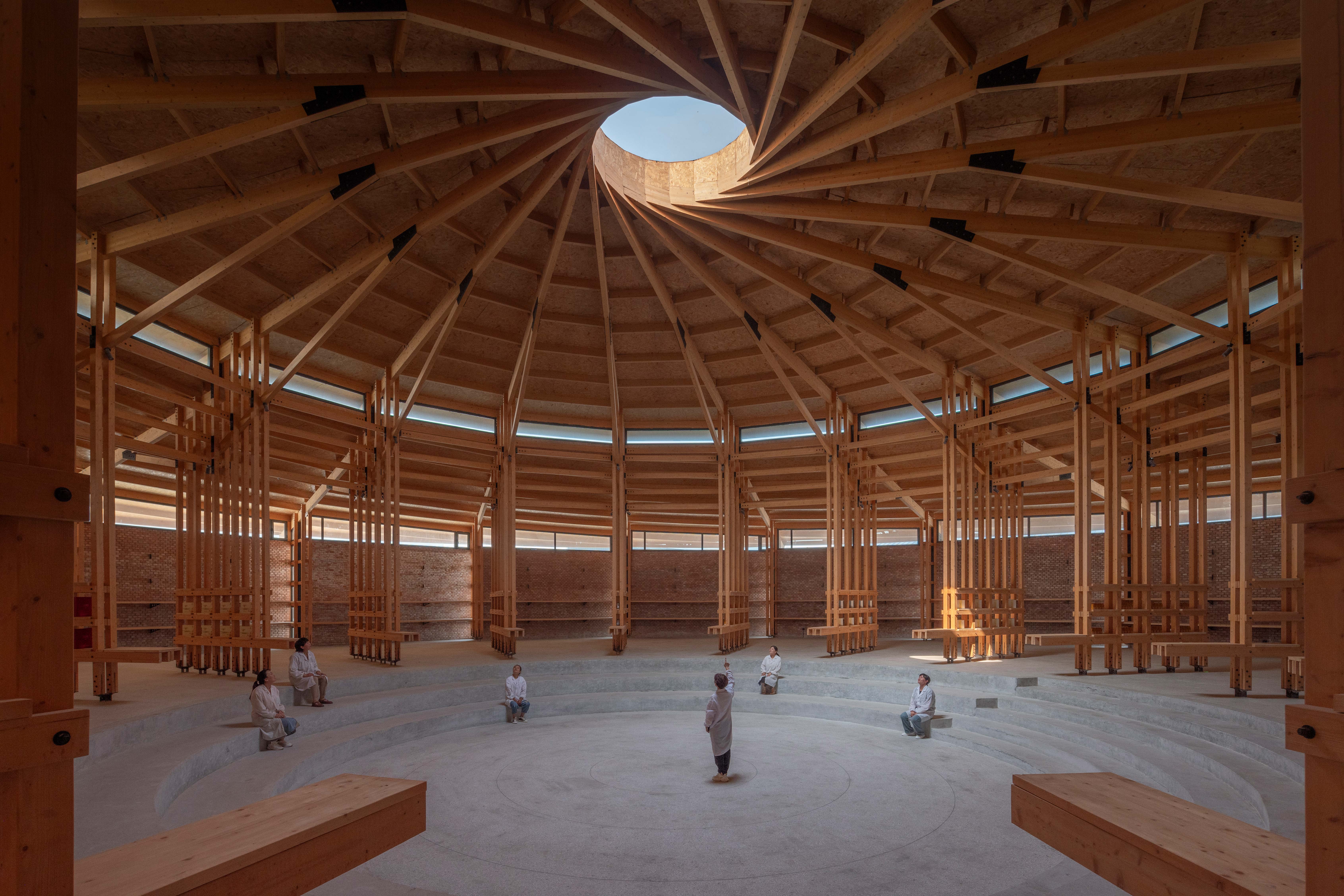
Prepared Rehmannia Root Crafts Exhibition Hall by LUO studio, Xiuwu County, Jiaozuo, China | Jury Winner, Cultural & Expo Centers, 12th Annual A+Awards
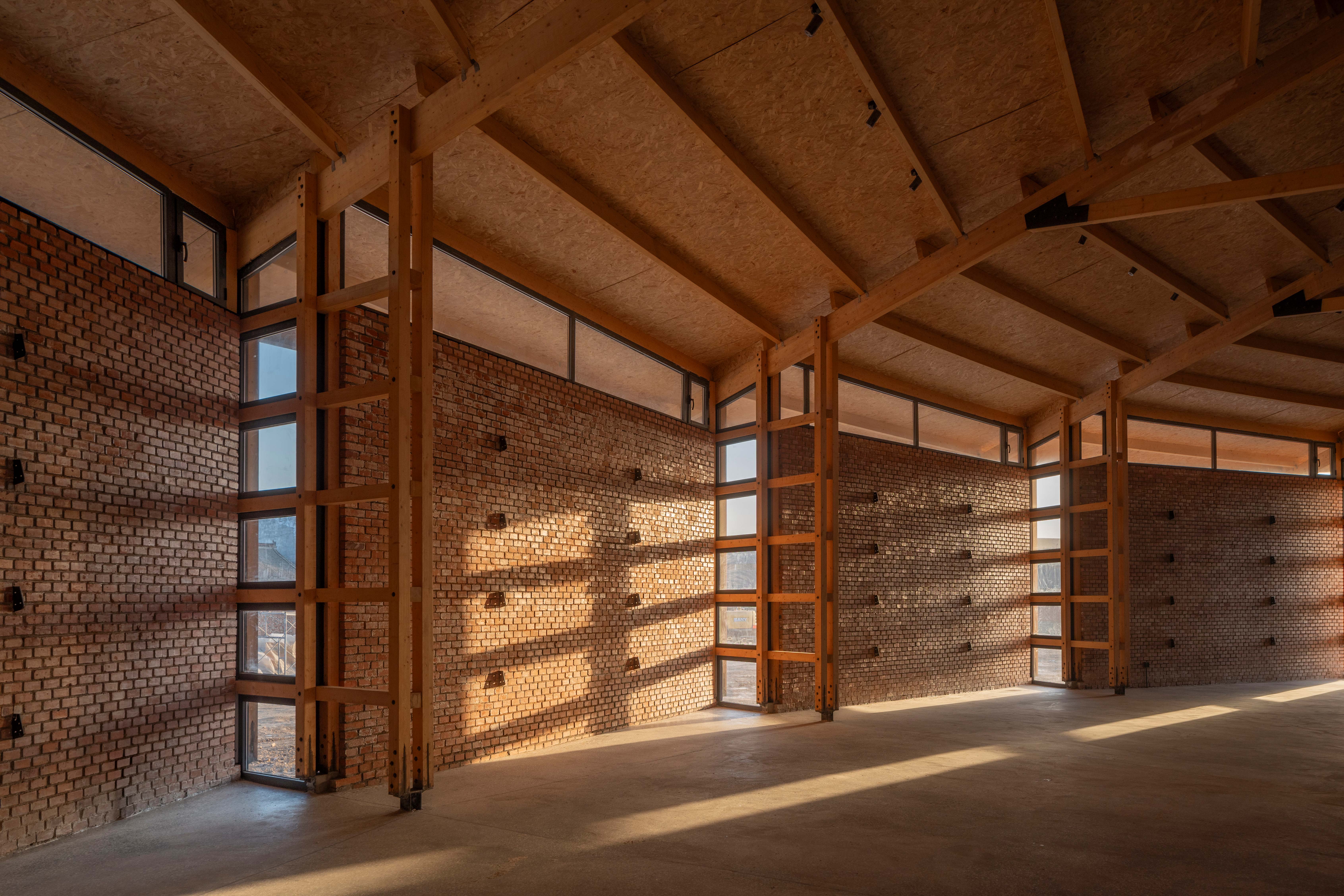
Prepared Rehmannia Root Crafts Exhibition Hall by LUO studio, Xiuwu County, Jiaozuo, China | Jury Winner, Cultural & Expo Centers, 12th Annual A+Awards
In an era where technology often overshadows tradition, LUO Studio takes a different approach. They believe history isn’t just something to remember but a foundation to build on. This philosophy shines through in one of their latest A+Award-winning projects — the Prepared Rehmannia Root Crafts Exhibition Hall in Xiuwu County.
Once an herb-processing factory, the space has been transformed into an exhibition hall that celebrates the region’s rich history and craftsmanship. The design draws inspiration from traditional Rehmannia root preparation methods, particularly the ancient practice of “nine steaming and nine sun-drying,” which emphasized the importance of sunlight. LUO Studio incorporated this concept by creating a circular layout that optimizes natural light, allowing it to play a central role in the building’s atmosphere. The structure itself uses local materials like red brick and timber with modern construction techniques, honoring the area’s cultural heritage while addressing contemporary needs.
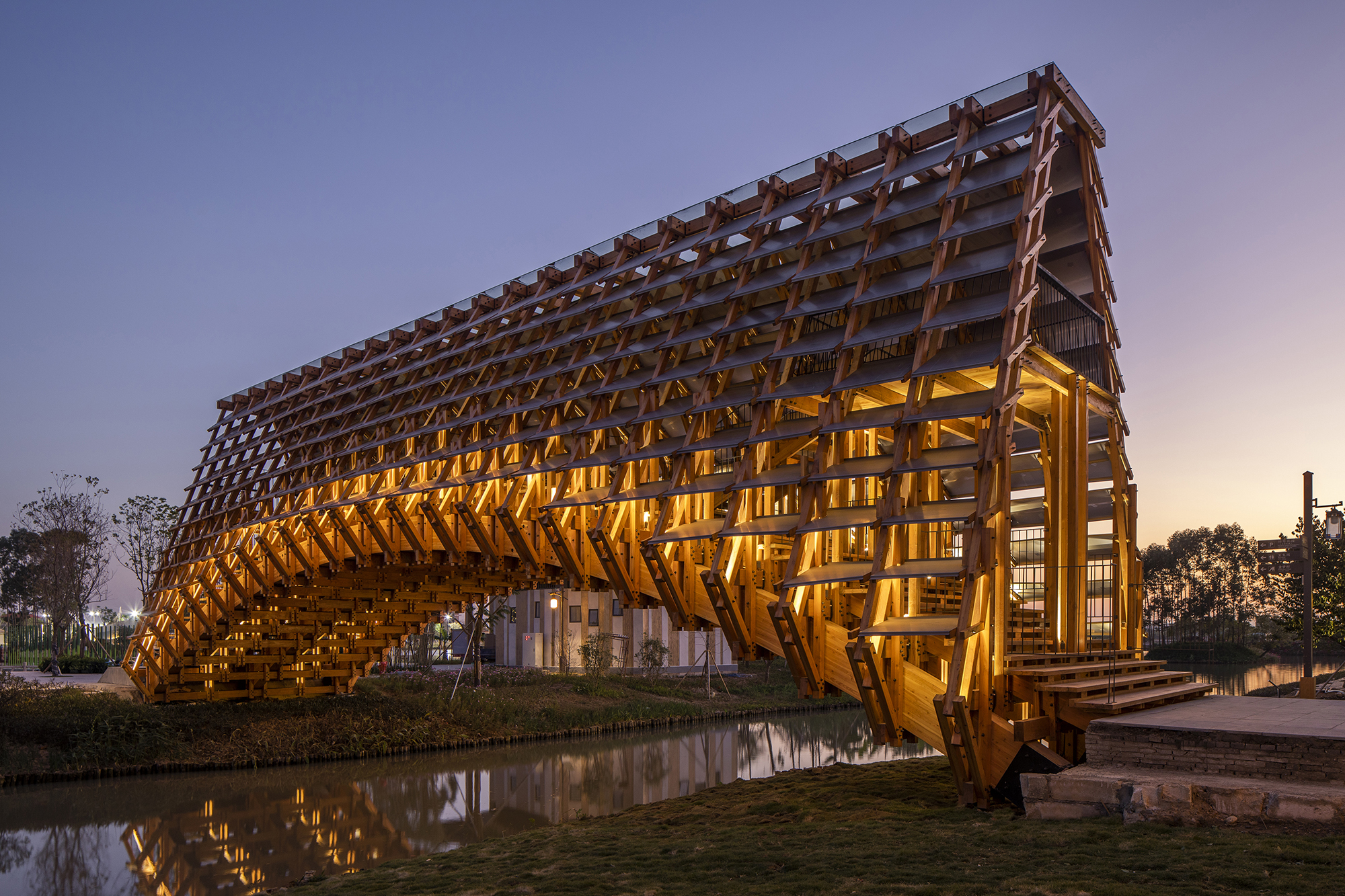
Timber Bridge in Gulou Waterfront by LUO studio, Jiangmen, China | Jury Winner, Architecture +Wood, 10th Annual A+Awards
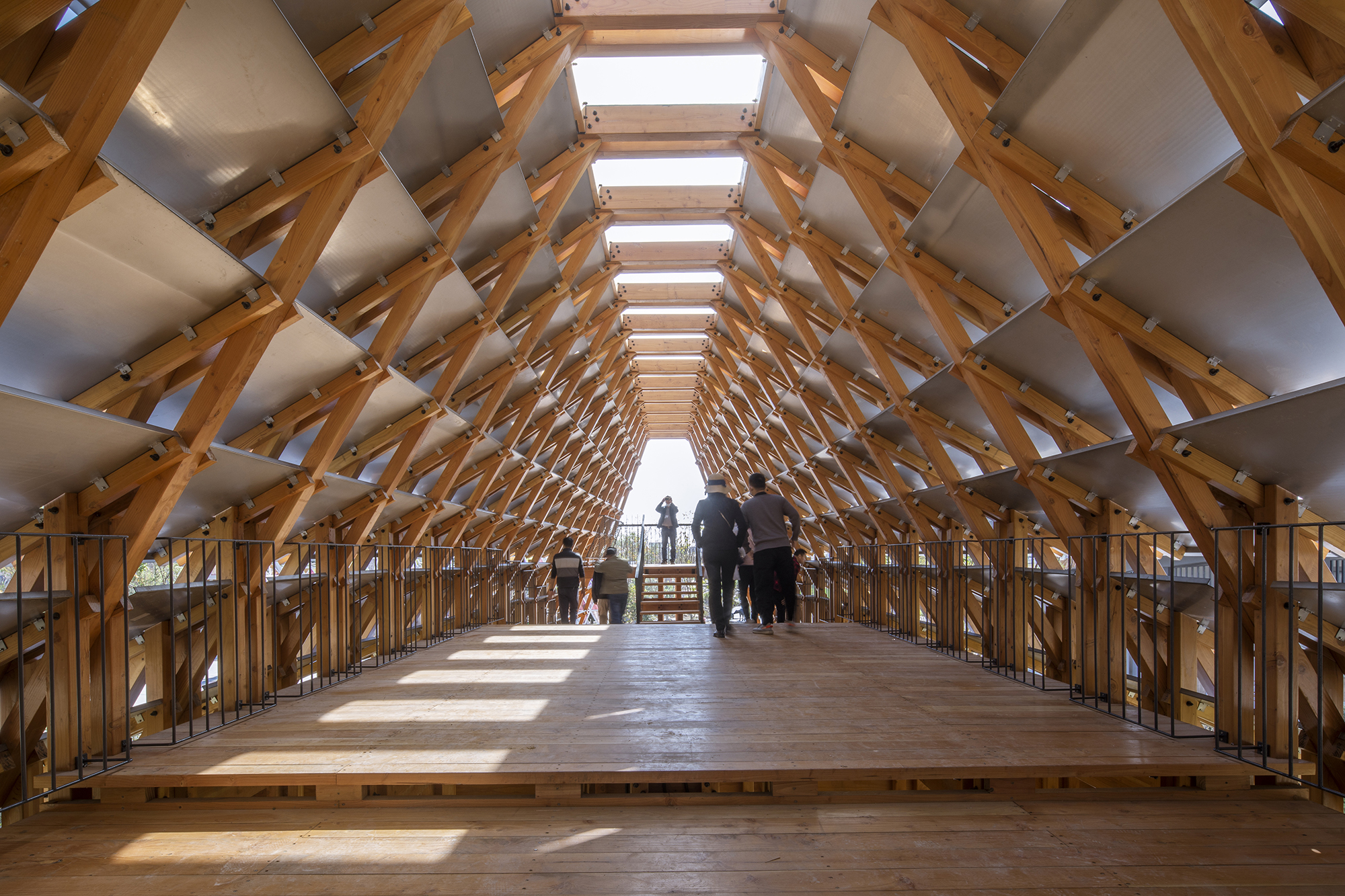
Timber Bridge in Gulou Waterfront by LUO studio, Jiangmen, China| Jury Winner, Architecture +Wood, 10th Annual A+Awards
Another project that exemplifies their commitment to innovation rooted in tradition is the Timber Bridge in Gulou Waterfront. Constructed from natural pine wood using time-honored Chinese arched techniques, the bridge is designed with three large curved beams, assembled on-site using a combination of traditional joinery and modern steel-strengthened bolts. This method, rooted in historical practices, provides both strength and flexibility, essential for accommodating varying boat sizes beneath.
A key feature of the bridge is its covered corridor, a nod to ancient Chinese bridge designs. Traditionally used to protect wooden structures from the elements, this corridor not only shields the bridge from heavy rainfall but also enhances the experience for visitors. The careful spacing of smaller wooden components creates a stable framework, while gaps between the layers allow natural light to filter through, offering glimpses of the water below.
Beyond Conventional Materials: Designing With Cardboard
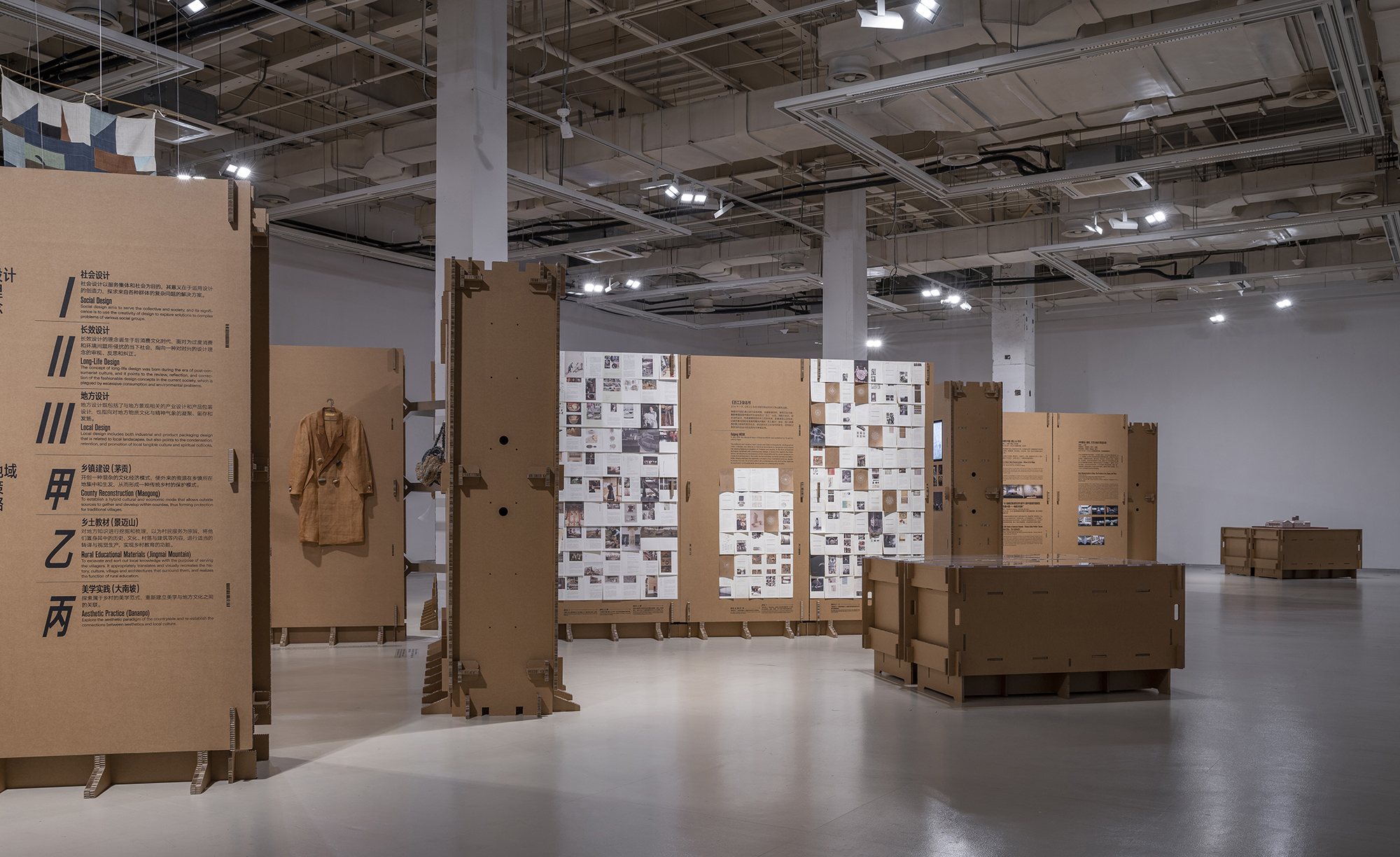
Corrugated Cardboard-Formed Exhibition Space by LUO studio, Shanghai, China | Popular Choice Winner, Sustainable Interior Project, 12th Annual A+Awards
Learning from the past and using traditional materials might be essential, but a few of LUO Studio’s projects that really stand out are not made from traditional, but rather unconventional materials.
The studio created a series of cardboard-formed exhibition spaces, taking a highly creative approach to a material often overlooked in architecture and transforming it into something both impressive and surprisingly functional.
Beginning with Version 1.0 for the “Back to the Future: Breaking the Time Barrier” exhibition in 2021, LUO Studio took on the challenge of using corrugated cardboard as the primary material for an entire exhibition space. This initial experiment was more than just a test of material — it was a statement about sustainability and creativity in architecture.
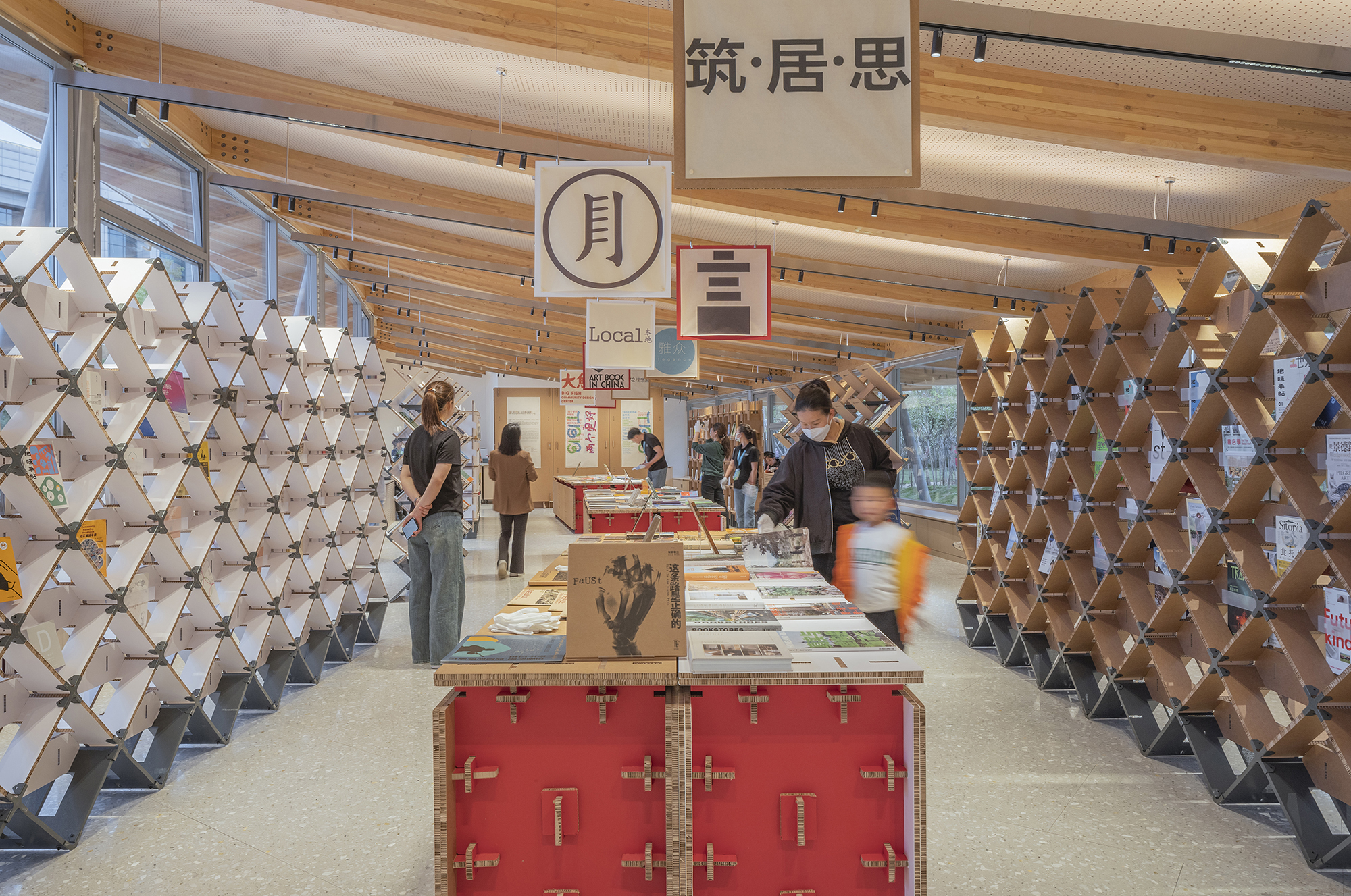
Cardboard-formed Exhibition Space 2.0 – Xinyang Book Market: Books ‘N Tea by LUO studio, Xinyang, China
Building on the success of their first attempt, Version 2.0 emerged in 2023 at the Xinyang Book Market. Here, they refined their approach, creating a space that was not only structurally sound but also visually engaging. The project demonstrated that cardboard, when used thoughtfully, can be both functional and aesthetically pleasing.
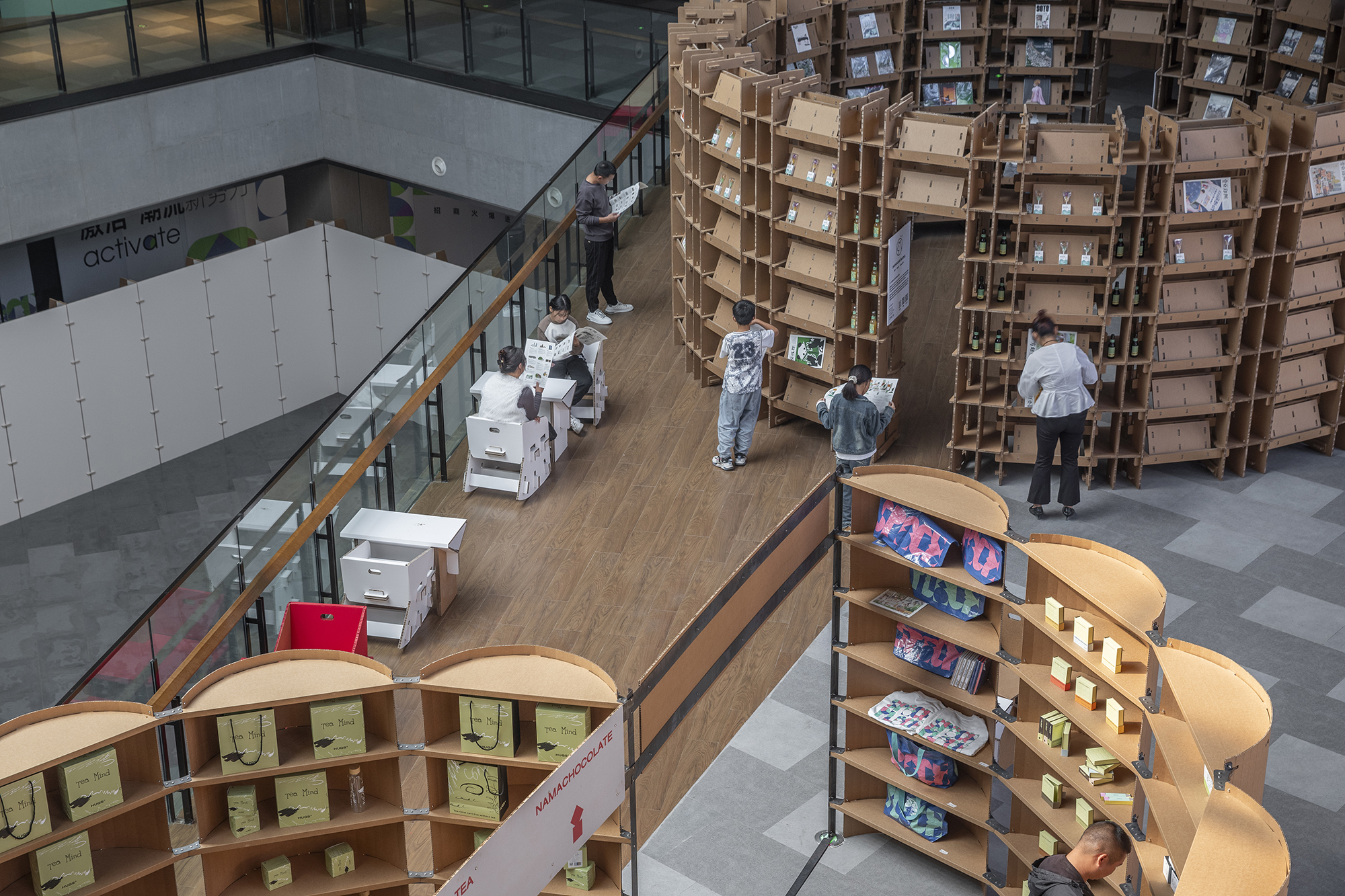
Two Paper Houses by LUO studio, Zhengzhou, China | Popular Choice Winner, Sustainable Interior Project, 12th Annual A+Awards
The latest evolution, Version 3.0, saw LUO Studio taking this concept even further with the creation of two “paper houses” for the Båt Odes to the Land exhibition in Zhengzhou. These structures were designed to be stable and durable despite the inherent challenges of using cardboard. The circular design of the spaces, combined with careful engineering, ensured that the buildings were not only practical but also conveyed a sense of ritual and purpose.
The result across all three versions is a series of spaces that defy expectations, showing that even a material as humble as cardboard can be transformed into a viable, sustainable option for architectural design.
Community-Centric and Adaptive Design: Building with a Purpose
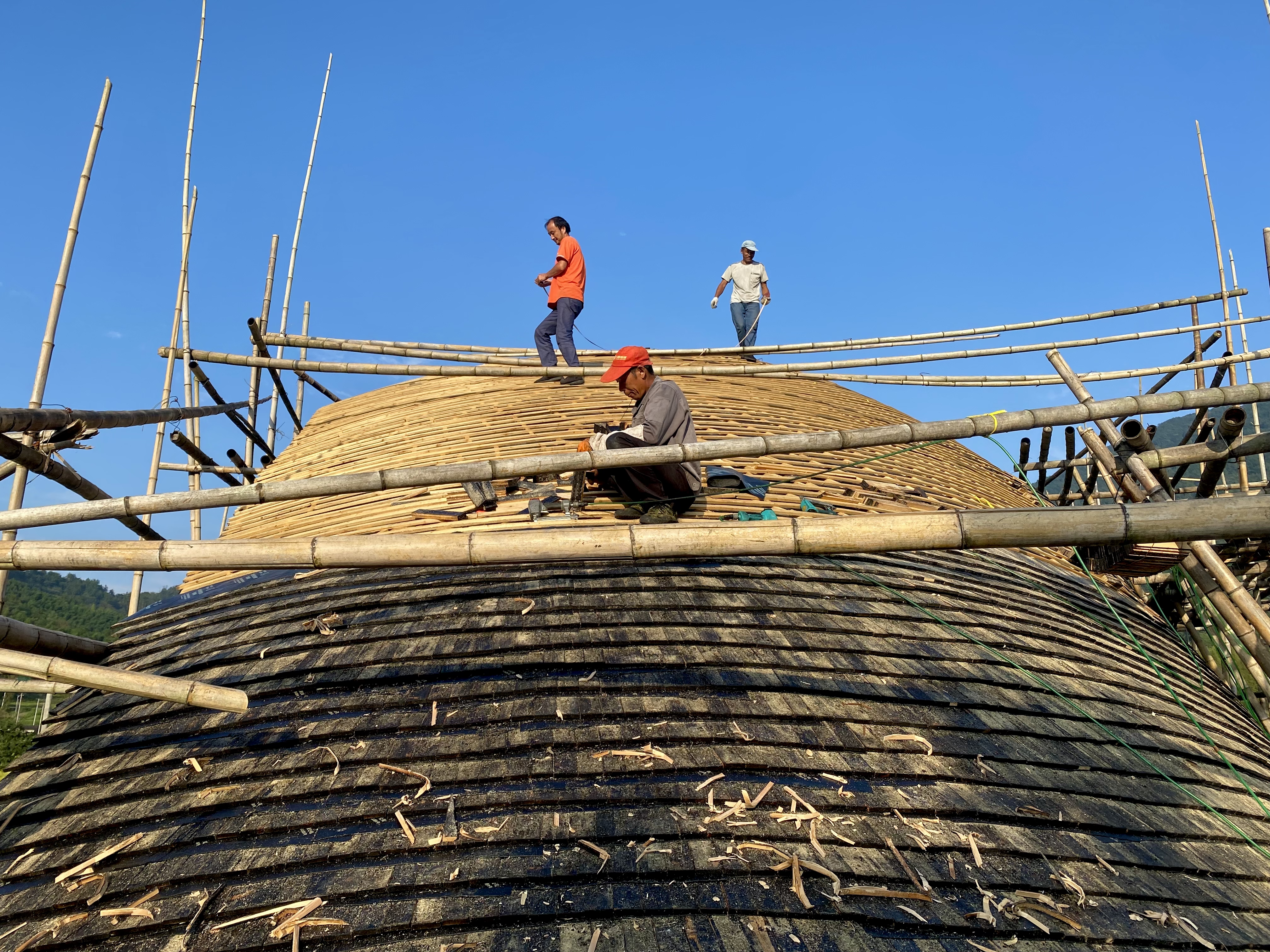
Jiulongfeng Children Learning Center for Conservation by LUO studio, Huangshan City, China | Popular Choice Winner, Architecture +Joy, 12th Annual A+Awards
From reviving ancient techniques to pushing the limits of material use, LUO Studio’s approach is both innovative and grounded. But their work doesn’t stop there. The studio is also deeply committed to building with a purpose, ensuring that their designs make a meaningful difference in the communities they serve.
A perfect example of this commitment is the Jiulongfeng Children’s Learning Center for Conservation, this year’s A+Awards Popular Choice winner in the Architecture +Joy category. The project goes beyond preserving traditional Huizhou carpentry techniques; it focuses on empowering the local community. Located in the heart of Shangling Village, the renovation was a collective effort, bringing together villagers, master carpenters and LUO Studio’s team. Community involvement was central to the project’s success, with residents participating in every stage, from site clearance to construction.
The outcome is more than just a learning center, but a space that reflects the community’s spirit, offering a welcoming environment where children can play and learn. The unique, cabin-like structure serves as a place for education and a source of pride and cultural identity for the village. By prioritizing community engagement, LUO Studio has created a project that not only meets functional needs but also reinforces the social fabric and collective ownership of the space.
Redefining the Role of the Architect
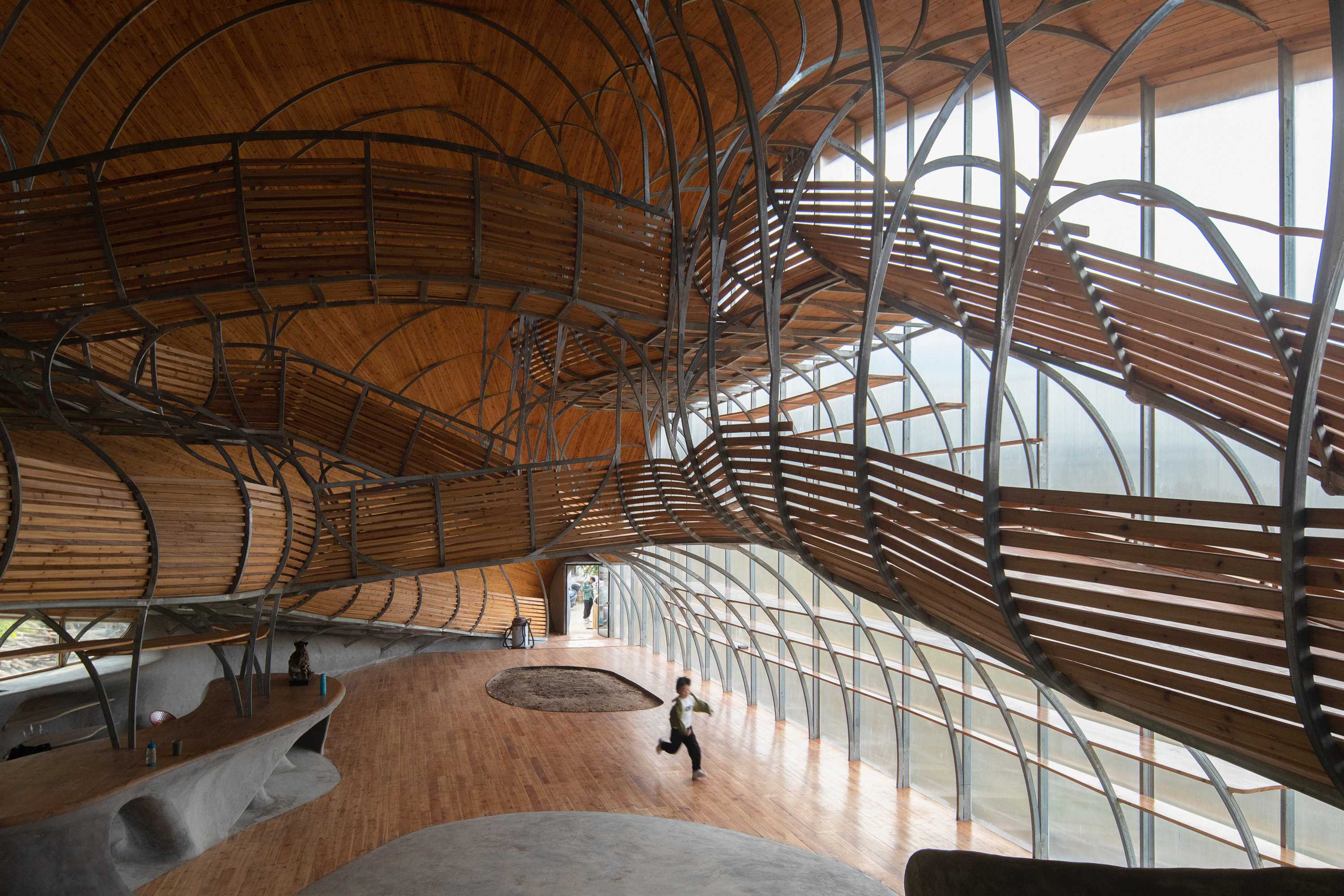
Jiulongfeng Children Learning Center for Conservation by LUO studio, Huangshan City, China | Popular Choice Winner, Architecture +Joy, 12th Annual A+Awards
LUO Studio’s work is a reminder that architecture can — and should — be more than just eye-catching structures. Their projects encapsulate a commitment to tradition, material innovation, sustainability and, perhaps most importantly, community engagement. By merging historical craftsmanship with modern needs, experimenting with unconventional materials like cardboard and centering their designs around the people they serve, LUO Studio is setting a new standard for what architecture can achieve.
At the heart of their work is a holistic approach that refuses to separate design from purpose. Whether it’s reviving ancient carpentry techniques or rethinking what’s possible with recyclable materials, LUO Studio consistently demonstrates that meaningful architecture is not about following trends but about understanding and responding to context — cultural, environmental and social. Their projects are as much about the process as the finished product, engaging communities and fostering a sense of shared ownership and pride.
Looking forward, LUO Studio’s approach offers a compelling model for the future of architecture. As the industry grapples with the challenges of sustainability, cultural preservation and social responsibility, their work provides a blueprint for how architects can create designs that are not only innovative but also deeply rooted in the communities they serve. In doing so, LUO Studio is redefining what it means to be an architect in the 21st century — one who listens, learns and builds with purpose.
The latest edition of “Architizer: The World’s Best Architecture” — a stunning, hardbound book celebrating the most inspiring contemporary architecture from around the globe — is now available. Order your copy today.
The post Material Matters: LUO Studio’s Outside-the-Box Approach to Modern Craftsmanship appeared first on Journal.
